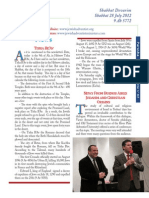Beshalach
Uploaded by
Ari Bar-ShainBeshalach
Uploaded by
Ari Bar-Shain"
Friday, January 10, 2014 / ' "
Beshalach
Candle Lighting: 4:57 Havdala: 6:03
Note: The Halachic times listed here are from www.myzmanim.com.
Sea-ing Miracles
By Mordechai Blau, 9 t h Grade
In this weeks Parasha, Bnei Yisrael leave Egypt in a miraculous fashion. Hashem performs an amazing miracle of splitting the sea and saves them from their Egyptian pursuers. After crossing the sea, the men and women of Bnei Yisrael sing the song now known as Az Yashir in thanks and appreciation. Today we say this prayer everyday as a reminder of the unbelievable miracle. Chazal (our sages) state that even the Jews non-Jewish servants saw visions that went beyond the vision of the Divine Chariot of the prophet Yechezkel. Right after Bnei Yisrael chant their song, the Torah talks about the beginning of the journey to Eretz Yisrael. At the start of the journey, Bnei Yisrael complain to Moshe that they have nothing to drink. After Hashem gives them water, they complain about the food. This seems rather strange! Did Bnei Yisrael not just see Hashem perform amazing miracles? Why do they not trust Hashem with providing them with their everyday needs? My grandfather, Rav Yosef Blau suggests the following answer: After the miracle of the splitting of the sea they indeed felt a very strong connection to Hashem. However, because there was no Mitzvah linked to this amazing miracle they went back to their everyday lives, and that connection did not last. In life it is important for us to be spiritually inspired, but to make the inspiration meaningful we must change our actions as well.
Page 1 of 6 A Fuchs Mizrachi Stark High School Publication
"
Touchdown Bnei Yisrael!
By Zach Zlatin, 11 t h Grade
State championship. Bnei Yisrael vs. Egypt. Egypt has won the last 3 state championships and haven't lost a game in over 30 years. It's the fourth quarter, down by six. Bnei Yisrael are on the opponents 18 yard line. With 10 seconds left on the clock, only a miracle can save them. The game has been a tight one. The Egyptians have played ferocious defense, holding back Bnei Yisrael from scoring a touchdown until this point. It all comes down to this.. The quarterback snaps the ball. He hands it off to Moshe. Moshe runs towards the huge wall of defensive linemen. His fullback, Nachshon Ben Aminadav, rams through the wall creating a small hole through which Moshe can run. But that's just the line. Moshe jukes out one player, spins around another. Only one man stand between him and the end zone, the safety, captain of the defense, the teams best player. The god of defense as they say. Moshe runs straight at him. He's at the 15. The 10. Moshe slants to his left. The safety is running full force trying to stop Moshe. Moshe's at the 8. The 5. The 3. Moshe is so close to the end zone. He dives forward with his hands stretched out to get the ball past the goal line. The safety dives forward, his hands also reaching out. The play seems like it is happening in slow motion. Moshe just barely gets through the safety's fingers. Touchdown! Moshe is going crazy. He gets on his knees and points his fingers to the sky. Bnei Yisrael sets up for the extra point. The kick is up, and good. Bnei Yisrael win! The whole crowd goes wild. The team goes crazy. All of the spectators storm the field. They raise Moshe up on their shoulders and sing " " Everyone sings and thanks Hashem, for helping and saving Bnei Yisrael. Essentially, this is what happens in Parashat Beshalach. Pharaoh's hardened heart finally crumbles under the plague of the firstborn. He begs Moshe to take his people and get out of Mitzrayim as fast as they can. Bnei Yisrael march out of Mitzrayim, but do not take the obvious and easiest route to Eretz Yisrael. Pharaoh then decides that he made a mistake and wants the Jews back as slaves. He gathers his men and chariots and chases after Bnei Yisrael. The mighty army of Egypt gallops away trying to recapture the escaping slaves. Bnei Yisrael hear the Egyptians coming and begin to doubt. They start believing that they won't survive on their journey. Hashem has a plan though, and needs a brave soul from Bnei Yisrael to step forward and show their faith in Him. According to the Midrash, this man is none other than Nachshon Ben Aminadav, leader of the tribe Yehuda, who begins to walk into the Yam Suf. Soon, the water is knee deep...waist deep...shoulder level. Just when all hope should be lost, Hashem kicks in with a great miracle. Moshe stretches out his arms and boom, the water splits. The greatest miracle of them all. The 12 tribes are amazed and since they dont really have anywhere else to go, they travel into the separated sea. They cross the dry land surrounded by walls of water on their sides. But, the Egyptians are still on their tail. Bnei Yisrael quickly run to the other side to safety, and Hashem closes the water on the Egyptians, instantly drowning them. It's a
Page 2 of 6 A Fuchs Mizrachi Stark High School Publication
moment of pure amazement! Bnei Yisrael had literally been slaves just a few days ago and now they are free men. A slow clap starts. The women start singing and praising Hashem. They reflect on the wonders that they just experienced and extol Hashem. They laud Him for His salvation, strength, and purely amazing capabilities. I think that we can learn two things from this whole event. Firstly, that underdogs can win. Secondly, we should be blessed to always think of Hashem when something great happens. The women, and then later the whole nation,
" recognize that Kriyat Yam Suf was all an act of Hashem, so they bless Him. You might say that it was easy for that generation to praise Hashem, because they saw so many overt miracles. Well, it was easier in that sense, but as Jews in the 21st century we should still strive to see the little miracles that we experience every single day. It is our job to praise and thank Hashem for everything. It is my hope for you, your family, and the entire Jewish people that we realize the Divine gifts that we constantly receive from Hashem.
Dual Feelings
By Rabbi Chaim Zimmerman
In this weeks Parsha, we read the wellknown passage about the Jewish people crossing through the sea and the subsequent drowning of the Egyptians. After this awe-inspiring account of Hashems complete control over the world, we come across one of the most interesting episodes of the Exodus story. We all know what happens next: The Jewish people come through the sea safely, see the Egyptians lying dead on the ground, and what do they do then? The entire nation breaks out into spontaneous song and dance about the death of the Egyptians! Hollywood musical-esque theatrics notwithstanding, a main question that should arise is: Since when are we allowed to sing about someone elses death!? This question reaches further levels of exclamation points when we look at a different pasuk in our parsha. In 14:20, the Torah says, and one did not approach the other the entire night. The Gemara in Megillah 10b asks what this line is referring to and explains that it is a proof that Hashem does not rejoice over the downfall of the wicked: In that hour, the ministering angels wanted to sing their songs [of praise for Hashem], but Hashem rebuked them, saying, The work of My hands is being drowned in the sea, and youre singing songs!? We now find that not only is it strange that the Jewish people are allowed to sing songs over the death of their enemies in the first place, but the Heavenly angels are yelled at for wanting to sing, while the Jews seem to get a get out of jail free card! And to add even more fuel to the fire, we sing this very song every single day during Pesukei Dzimrah! Why are we allowed to sing this song every day? Rabbi Shimon Schwab gives an amazing answer to this question. He writes that one of the differences between angels and people is that angels can only do one thing at a time; they can
never experience two things simultaneously. Page 3 of 6 A Fuchs Mizrachi Stark High School Publication
" However, a human being has the ability to do two contrasting things at the same time. He can feel sorry for the drowning Egyptians, while he rejoices over his own redemption. Therefore, the angels, whose one-track minds would only allow them to experience the destruction of the Egyptians, were not allowed to sing during that time. But as humans, we are allowed to sing, thanking Hashem for the wonders He caused for us, and at the same time lamenting over the loss of human life. The Midrash in Pesikta DRav Kahana also alludes to this duality in a comment about reciting Hallel on Pesach. It asks why we only say half-Hallel for most of Pesach, whereas we say the full Hallel every day of Sukkot? The answer given is because the Egyptians were drowned on the seventh day of Pesach, and as Shlomo Hamelech writes in Mishlei: Do not rejoice in the downfall of your enemy. Thus we see that although we rejoice by singing Hallel on Pesach, we still tone down our joy at the very same time to mourn the deaths that occurred during our salvation. Perhaps the most striking example of these concepts that Ive ever personally heard is a story involving my niece: One Pesach Seder night, when my niece, Devorah, was 7 years old, she went with her father my brother to the open the door for Kos Shel Eliyahu. As they walked back to their seats, my brother noticed that Devorah looked sad. Yes. But this year he didnt come. My brother chose his words carefully before asking, Why do you think he didnt come this year? Devorah sat and thought for a minute, and then she replied, I think he didnt come this year, because this year, I felt that the Mitzrim deserved to be killed. It is clear from Mishlei and from the Gemara that Hashem does not rejoice over the deaths of His creations. Yet the halacha sefarim tell us that were supposed to feel authentic joy while we are singing the Az Yashir every morning, as if we were singing it right there with Moshe Rabbeinu at the sea. I believe that we should realize that there is always a balance in life. We, and only we, can experience the dual feelings of happiness for the wonders that Hashem does for us, and the sadness for the casualties that may occur along the way. With Hashems help, we will all be able to embrace these feelings, and be worthy of experiencing the joy of the complete geulah with Eliyahu Hanavi Bimhera Byameinu. Whats wrong sweety? he asked. Well, Devorah answered. I didnt see Eliyahu HaNavi this time. My brother marveled at this statement by his 7-year-old daughter, and then asked, Do you usually see Eliyahu HaNavi?
Page 4 of 6 A Fuchs Mizrachi Stark High School Publication
"
Ripening of a Nation
By Moria Raz-Bat Sherut
This week, we celebrate Tu Bshvat, a special holiday dedicated to appreciating nature and . If you think about it, the timing is a little weird. If were supposed to see and appreciate nature, why are we celebrating it at a gloomy time of year when we cant even see a blade of grass? Shouldnt we be celebrating Tu Bshvat in Nissan, a time when the birds start chirping and the flowers begin to bloom? Putting that aside for a second, there are many questions brought up the first time Yetziat Mitzrayim is mentioned in the Torah. Hashem tells Avraham that Bnei Yisrael will be numerous like the stars, and that they will inherit the land. Along with all of these positive things he is told that his descendants will be slaves in a foreign land for 400 years. Is this the right time to be telling the first of the Avot about Bnei Yisraels servitude? The Malbim explains that while one may go through pain and agony in their youth, they will grow stronger from it and will become a better person as a result. The same goes for a nation that is put through a lot. They will come out stronger. This perush shows us that Yetziat Mitzraim wasn't a punishment. It was just part of the process Bnei Yisrael needed to go through in order to become Am Yisrael. On Tu BShvat, we dont see ripe and beautiful fruit. We see trees that will blossom and in a matter of months. After bearing the tough, cold weather, the branches will grow sweet juicy fruits. Similarly, In this weeks Parsha Bnei Yisrael leave Mitzraim, and rather than walking directly to Israel, they start heading in the direction of Mitzraim. Whats going on here? Why are they taking two steps forward and then one step back? At this point, only those who believe in Hashem understand that this was the plan of Hashem all along and that this step completes their redemption from Mitzraim. The reason we celebrate Tu BShvat during this season is, because although we cannot see the fruits (the result) yet, we know that they are starting to grow now. We joyously commemorate the beginning of this new thing that's about to happen.
Page 5 of 6 A Fuchs Mizrachi Stark High School Publication
"
Shabbat Table Discussion Questions:
By Avi Hartstone, 10 t h Grade
1. Why did Bnei Yisrael not travel to Eretz Yisrael via the shortest route of Derech Plishtim? (13:17) 2. How can Paro be surprised that the Jews left if he let them go? (14:5) 3. When Bnei Yisrael complain about the lack of meat why does Hashem respond with providing Mann? (16:3-4) 4. Why does Moshe need to physically keep his hands raised to win the war, even though it was hard for him? (17:11) 5. Why do we need to remember the battle with Amalek forever? (17:14)
Email us at FMSshemesh@gmail.com with your answers, and we will choose our favorite one to publish every week!"
Brought to you by: Staff: Editor in Chief- Ari Bar-Shain Associate Editors- Eli Meyers, Etan Soclof, and Yosef Coleman Layout Manager- Zev Karasik Faculty Consultant-Rav Rick Schindelheim Distribution Manager-Rivka Coleman Faculty Manager-Yael Blau Head Writers-Avi Hartstone and Zak Fleischman Student Writers: o Alan Soclof o Ami Shamir o Ben Jaffe o Bentzion Goldman o Ilan Senders o Jenna Fox o Jennifer Brenis o Joey Senders o Michael Brenis o Mordechai Blau o Sarah Pincus o Seth Weiss o Sonny Kugelman o Talya Engelhart o Yonah Bar-Shain o Zach Zlatin o Ziva Bibbins
!
Page 6 of 6 A Fuchs Mizrachi Stark High School Publication
You might also like
- Passover Haggadah: As Commented Upon By Elie Wiesel and Illustrated bFrom EverandPassover Haggadah: As Commented Upon By Elie Wiesel and Illustrated b4/5 (10)
- The Wicked Gatherer: Volume XIV - Issue 23 The DRS Weekly Torah PublicationNo ratings yetThe Wicked Gatherer: Volume XIV - Issue 23 The DRS Weekly Torah Publication12 pages
- Likutei Ohr: A Publication of YULA Boys High SchoolNo ratings yetLikutei Ohr: A Publication of YULA Boys High School2 pages
- I Betroth You To Me Forever: The Unusual Marriage of Hoshea and What It Teaches Us About Our Relationship With G-DNo ratings yetI Betroth You To Me Forever: The Unusual Marriage of Hoshea and What It Teaches Us About Our Relationship With G-D5 pages
- Likutei Ohr: A Publication of YULA Boys High SchoolNo ratings yetLikutei Ohr: A Publication of YULA Boys High School2 pages
- Tisha Be'Av: Shabbat Devarim Shabbat 28 July 2012 9 Ab 5772No ratings yetTisha Be'Av: Shabbat Devarim Shabbat 28 July 2012 9 Ab 57725 pages
- Thankful For The Wars: by Jeremy Teichman, 12th Grade, Editor of Student ArticlesNo ratings yetThankful For The Wars: by Jeremy Teichman, 12th Grade, Editor of Student Articles6 pages
- Keeping The Wicked Around - and Informed! Balak 2011100% (1)Keeping The Wicked Around - and Informed! Balak 20114 pages
- An Enlightening Source: Shem: A Model of An Appreciative SonNo ratings yetAn Enlightening Source: Shem: A Model of An Appreciative Son8 pages
- Deep in the Heart: The Groom Who Went to War, Aharon KarovFrom EverandDeep in the Heart: The Groom Who Went to War, Aharon KarovNo ratings yet
- Likutei Ohr: A Publication of YULA Boys High SchoolNo ratings yetLikutei Ohr: A Publication of YULA Boys High School2 pages
- The Nature of Prayer: Tzara'ath, (A Spiritual Malady With Physical Manifestations) As (White As) Snow. ThenNo ratings yetThe Nature of Prayer: Tzara'ath, (A Spiritual Malady With Physical Manifestations) As (White As) Snow. Then4 pages
- Elevating The Mundane: by Yehuda Fogel, 12th GradeNo ratings yetElevating The Mundane: by Yehuda Fogel, 12th Grade10 pages
- Haggadah - Habonim Dror 2012 - Yoreh and HatzavNo ratings yetHaggadah - Habonim Dror 2012 - Yoreh and Hatzav22 pages
- Likutei Ohr: A Publication of YULA Boys High SchoolNo ratings yetLikutei Ohr: A Publication of YULA Boys High School2 pages
- Yeshivat Eretz Hatzvi: Insights Into Rosh Hashanah & Yom Kippur by The Faculty ofNo ratings yetYeshivat Eretz Hatzvi: Insights Into Rosh Hashanah & Yom Kippur by The Faculty of48 pages
- Mutual Respect: by Ariel Sacknovitz, Director of Production, 12th GradeNo ratings yetMutual Respect: by Ariel Sacknovitz, Director of Production, 12th Grade8 pages
- Voices of Israel at 70 - Shabbat Shirah Lyrics100% (1)Voices of Israel at 70 - Shabbat Shirah Lyrics16 pages
- J A N Y R H S A at V: Ewish Dventists in Ew Ork Osh AshanaNo ratings yetJ A N Y R H S A at V: Ewish Dventists in Ew Ork Osh Ashana5 pages
- Likutei Ohr: A Publication of YULA Boys High SchoolNo ratings yetLikutei Ohr: A Publication of YULA Boys High School2 pages
- Mourning For Individuals: Rabbi Jesse HornNo ratings yetMourning For Individuals: Rabbi Jesse Horn3 pages
- Likutei Ohr: A Publication of YULA Boys High SchoolNo ratings yetLikutei Ohr: A Publication of YULA Boys High School2 pages
- Passover Haggadah: As Commented Upon By Elie Wiesel and Illustrated bFrom EverandPassover Haggadah: As Commented Upon By Elie Wiesel and Illustrated b
- The Wicked Gatherer: Volume XIV - Issue 23 The DRS Weekly Torah PublicationThe Wicked Gatherer: Volume XIV - Issue 23 The DRS Weekly Torah Publication
- Likutei Ohr: A Publication of YULA Boys High SchoolLikutei Ohr: A Publication of YULA Boys High School
- I Betroth You To Me Forever: The Unusual Marriage of Hoshea and What It Teaches Us About Our Relationship With G-DI Betroth You To Me Forever: The Unusual Marriage of Hoshea and What It Teaches Us About Our Relationship With G-D
- Likutei Ohr: A Publication of YULA Boys High SchoolLikutei Ohr: A Publication of YULA Boys High School
- Tisha Be'Av: Shabbat Devarim Shabbat 28 July 2012 9 Ab 5772Tisha Be'Av: Shabbat Devarim Shabbat 28 July 2012 9 Ab 5772
- Thankful For The Wars: by Jeremy Teichman, 12th Grade, Editor of Student ArticlesThankful For The Wars: by Jeremy Teichman, 12th Grade, Editor of Student Articles
- Keeping The Wicked Around - and Informed! Balak 2011Keeping The Wicked Around - and Informed! Balak 2011
- An Enlightening Source: Shem: A Model of An Appreciative SonAn Enlightening Source: Shem: A Model of An Appreciative Son
- Deep in the Heart: The Groom Who Went to War, Aharon KarovFrom EverandDeep in the Heart: The Groom Who Went to War, Aharon Karov
- Likutei Ohr: A Publication of YULA Boys High SchoolLikutei Ohr: A Publication of YULA Boys High School
- The Nature of Prayer: Tzara'ath, (A Spiritual Malady With Physical Manifestations) As (White As) Snow. ThenThe Nature of Prayer: Tzara'ath, (A Spiritual Malady With Physical Manifestations) As (White As) Snow. Then
- Elevating The Mundane: by Yehuda Fogel, 12th GradeElevating The Mundane: by Yehuda Fogel, 12th Grade
- I Am Hava: A Song's Story of Love, Hope & JoyFrom EverandI Am Hava: A Song's Story of Love, Hope & Joy
- Likutei Ohr: A Publication of YULA Boys High SchoolLikutei Ohr: A Publication of YULA Boys High School
- Yeshivat Eretz Hatzvi: Insights Into Rosh Hashanah & Yom Kippur by The Faculty ofYeshivat Eretz Hatzvi: Insights Into Rosh Hashanah & Yom Kippur by The Faculty of
- Mutual Respect: by Ariel Sacknovitz, Director of Production, 12th GradeMutual Respect: by Ariel Sacknovitz, Director of Production, 12th Grade
- J A N Y R H S A at V: Ewish Dventists in Ew Ork Osh AshanaJ A N Y R H S A at V: Ewish Dventists in Ew Ork Osh Ashana
- Likutei Ohr: A Publication of YULA Boys High SchoolLikutei Ohr: A Publication of YULA Boys High School
- Likutei Ohr: A Publication of YULA Boys High SchoolLikutei Ohr: A Publication of YULA Boys High School
- In the Beginning Were Stories, Not Texts: Story TheologyFrom EverandIn the Beginning Were Stories, Not Texts: Story Theology



































































